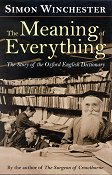The making of the Dictionary was a remarkable achievement by hundreds of ordinary and extraordinary men and women, whose stories have until now remained untold. Simon Winchester illuminates this diverse cast of characters for the first time, uniting original research and evidence from the Oxford University Press archives with gripping narrative flair.
In witty and absorbing prose, he paints lively portraits of such key figures as the brilliant but tubercular first editor Herbert Coleridge (grandson of the poet), the colourful, boisterous Frederick Furnivall (sometimes remembered for his fondness for his female sculling team), and James Augustus Henry Murray, who spent a half-century bringing the project to fruition. The story traces the origins of the English language and the first attempts to catalogue it, the growing desire for an all-inclusive dictionary, through to the triumphant publication of the first edition of the Dictionary in 1928 and beyond.
The Meaning of Everything is rich with captivating detail: how the word aardvark narrowly missed inclusion after being deemed too ‘scientific’ and too ‘foreign’, which editor of the Dictionary became the inspiration for Kenneth Grahame’s Ratty in The Wind in the Willows, why Tolkien found it so difficult to define walrus, and how the word bondmaid was missed out of the first edition simply because the piece of paper on which it was written had fallen behind a pile of books.
With his characteristic gift for storytelling, Simon Winchester brings one of the most fascinating of forgotten histories to life.

